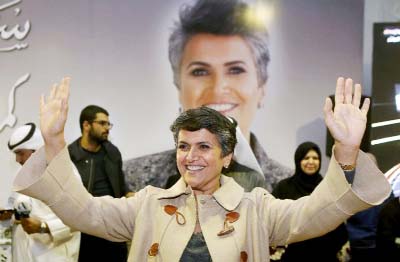
AFP, Kuwait City :
Islamist-dominated opposition groups and their allies secured nearly half of the Kuwaiti parliament’s seats, official results showed Sunday, raising fears of fresh political wrangling in the oil-rich Gulf state.
The opposition and its allies won 24 of the assembly’s 50 seats, the electoral authority announced following Saturday’s snap election called after a dispute over the hiking of petrol prices.
The Islamist, nationalist and liberal opposition contested the election after a four-year boycott in protest over the government’s amendment of the key voting system.
Around half of the opposition candidates who won seats are Islamists from a Muslim Brotherhood-linked group and Salafists.
Voters dealt a heavy blow to candidates from the outgoing parliament, with more than half of them failing to make it into the new assembly.
Two of three cabinet ministers also failed in their bid for re-election.
One third of the members of the new parliament are relatively young and fresh on the political scene.
Only one woman was elected and the Muslim Shiite minority was reduced to six seats from nine in the previous house.
But despite the outcome, Emir Sheikh Sabah al-Ahmad Al-Sabah is set to ask the incumbent prime minister or another leading figure from the ruling family to form a new cabinet.
“I think this composition will lead to confrontations between opposition MPs and the next government,” political analyst Mohammad al-Ajmi told AFP.
“There are many issues that could spark disputes: economic measures, revoking of citizenships and others,” said Ajmi.
In the past two years, the government revoked the citizenship of several leading opposition figures and their family members, citing various motives.
The emir called the poll after dissolving the previous parliament due to a dispute over raising petrol prices.
Saturday’s election saw a turnout of about 70 percent amid divisions over cuts in subsidies due to falling oil revenues.
Analyst Dahem al-Qahtani said the opposition had made an “impressive showing”.
“Kuwaiti voters have punished those who let them down… and rejected the austerity measures,” he told AFP.
Qahtani said for the government to prevent a standoff, it should make initiatives for cooperation with the opposition.
“If the government makes such initiatives, it may succeed in striking a needed political balance and avoid disputes,” he said.
“If not, confrontations could start from day one,” Qahtani said.
Kuwait was rocked with a series of political crises between 2006 and 2013 when an entirely pro-government parliament was elected.
Islamist-dominated opposition groups and their allies secured nearly half of the Kuwaiti parliament’s seats, official results showed Sunday, raising fears of fresh political wrangling in the oil-rich Gulf state.
The opposition and its allies won 24 of the assembly’s 50 seats, the electoral authority announced following Saturday’s snap election called after a dispute over the hiking of petrol prices.
The Islamist, nationalist and liberal opposition contested the election after a four-year boycott in protest over the government’s amendment of the key voting system.
Around half of the opposition candidates who won seats are Islamists from a Muslim Brotherhood-linked group and Salafists.
Voters dealt a heavy blow to candidates from the outgoing parliament, with more than half of them failing to make it into the new assembly.
Two of three cabinet ministers also failed in their bid for re-election.
One third of the members of the new parliament are relatively young and fresh on the political scene.
Only one woman was elected and the Muslim Shiite minority was reduced to six seats from nine in the previous house.
But despite the outcome, Emir Sheikh Sabah al-Ahmad Al-Sabah is set to ask the incumbent prime minister or another leading figure from the ruling family to form a new cabinet.
“I think this composition will lead to confrontations between opposition MPs and the next government,” political analyst Mohammad al-Ajmi told AFP.
“There are many issues that could spark disputes: economic measures, revoking of citizenships and others,” said Ajmi.
In the past two years, the government revoked the citizenship of several leading opposition figures and their family members, citing various motives.
The emir called the poll after dissolving the previous parliament due to a dispute over raising petrol prices.
Saturday’s election saw a turnout of about 70 percent amid divisions over cuts in subsidies due to falling oil revenues.
Analyst Dahem al-Qahtani said the opposition had made an “impressive showing”.
“Kuwaiti voters have punished those who let them down… and rejected the austerity measures,” he told AFP.
Qahtani said for the government to prevent a standoff, it should make initiatives for cooperation with the opposition.
“If the government makes such initiatives, it may succeed in striking a needed political balance and avoid disputes,” he said.
“If not, confrontations could start from day one,” Qahtani said.
Kuwait was rocked with a series of political crises between 2006 and 2013 when an entirely pro-government parliament was elected.

